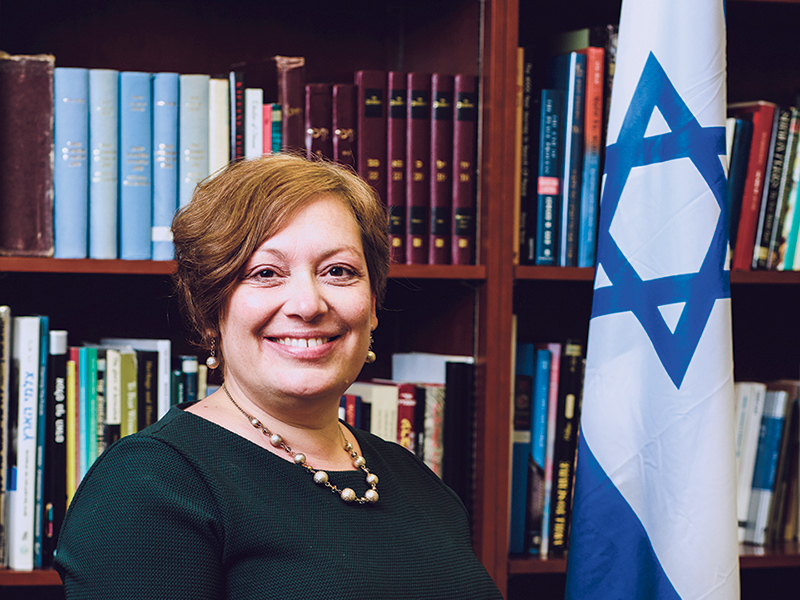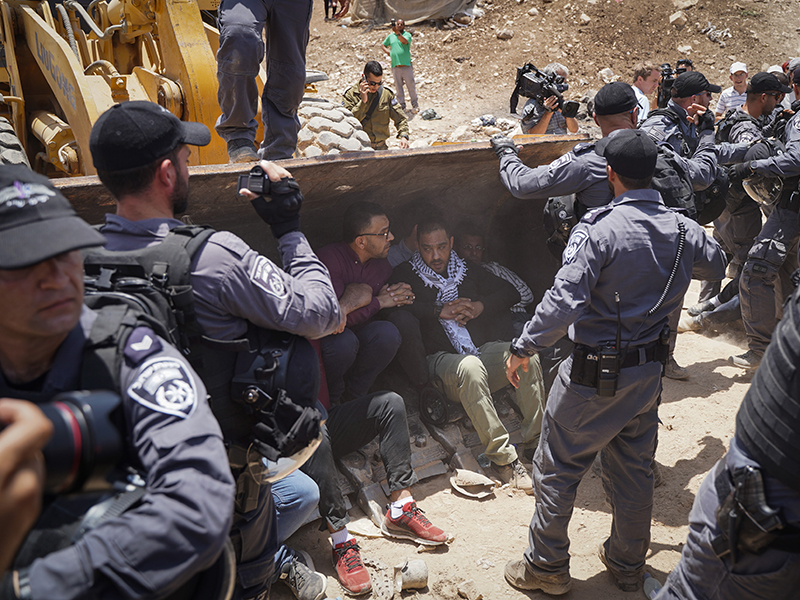On the morning of July 5, not long before the Israeli Supreme Court froze the demolition of the Palestinian-Bedouin village Khan al-Ahmar, Canadian student Michaela Lavis was arrested along with other human rights activists who were conducting a “stand-in,” to try and stop the bulldozers.
Lavis was released the following morning.
Lavis, 21, is a child and youth studies student at Ryerson University in Toronto. She was part of a group that attempted to block one of the bulldozers by chaining themselves together and sitting in front of it. A member of the Israeli human rights organization B’Tselem was also arrested at the demonstration.
Lavis had been volunteering in the West Bank city of Ramallah with a group called Defence for Children International-Palestine. She had also been volunteering with an occupational therapist who provides support to special-needs children in the area.
The Israeli Supreme Court authorized the demolition of Khan al-Ahmar in May, on the grounds that the homes were built without permits. The village is home to over 170 people, including 90 children. Israel plans to forcibly transfer them to an area near the West Bank town of Abu Dis.
Israeli authorities are planning to build a road to the village to aid in the evacuation, after which they say the demolition will resume. The Civil Administration closed the area around Khan al-Ahmar to the general public until the end of July. The Supreme Court delayed the evacuation, while it considers numerous legal challenges.
READ: ISRAELI ARABS PROTEST PLANS TO RELOCATED NEGEV BEDOUIN
The U.K., France, Germany, Italy and Spain submitted protests against Israel’s plan to demolish the village on July 5, stating that the demolition, “together with plans for new settlement construction for Israelis in the same area, exacerbate threats to the viability of the two-state solution and further undermine prospects for a lasting peace.”
Khan al-Ahmar is situated between Jerusalem and the Israeli settlement of Ma’ale Adumim, and connecting the two areas would split the West Bank, which critics say would make a two-state solution more difficult to achieve.
“Building in (the area) would separate the northern West Bank (Samaria) from the southern West Bank (Judea), turning what is now a 45 minute journey between Ramallah and Bethlehem into a two hour one, and rendering a future Palestine dependent on a patchwork of tunnels and bypass roads,” according to the Israel Policy Forum, an American non-profit that advocates for a negotiated two-state solution.
In pre-state Israel, the Jahalin Bedouin who now live in the village lived in the area of Tel Arad in the Negev. Following the 1948 Arab-Israeli War, the IDF relocated them to the West Bank, where they are today. Beginning in 1997, Israel demolished three of their villages and transferred the inhabitants to what is now al-Jabal. Efforts to move the remaining Bedouin to al-Jabal have been underway for years, and have been met with fierce resistance from the Bedouin themselves, as well as several human rights organizations.
The Jewish human rights group T’ruah says that the move “is incompatible with Bedouin society and culture.” Many critics have pointed out that the Bedouin do not want to move to the new location, which is near the town’s garbage dump. Some local Jewish settlers have also taken the side of the Bedouin and joined them in their legal battle.
Defenders of the move say that it is just a matter of complying with Israeli law.

“The semi-nomadic community of Khan al-Ahmar … includes a small cluster of temporary structures, in close and dangerous proximity to a major highway,” Galit Baram, Israel’s consul general to Toronto and Western Canada, told the The CJN via email. “The structures were built without a permit. The relevant authorities require all structures to have a valid permit, so as to ensure public order and safety. The families involved were contacted by the Civil Administration and were offered an alternative location.”
“The authorities acted in accordance with the relevant procedures and regulations pertinent to the West Bank,” Baram continued. “The issue is still before the High Court of Justice, following a petition by the families.”
Scott Anderson, UNRWA’s director of operations in the West Bank, said Israel’s plans would be “a grave breach of the Geneva Convention,” adding that “many (were) displaced from the Negev as a result of the 1948 conflict; they now face being displaced for a second time. As we have seen in similar circumstances in the past, the transfer of rural Bedouin to the urban setting of Jabal West, proposed by the Israeli state, will likely prove socially and economically devastating.”
The Canadian government has said that it is “deeply concerned” about the planned demolition of the village and is “actively engaging Israeli officials on this issue and urge them to reconsider” their decision.
Before Lavis was released, a spokeswoman for Global Affairs Canada told CTV that “consular services have been provided to the Canadian and the family.”
